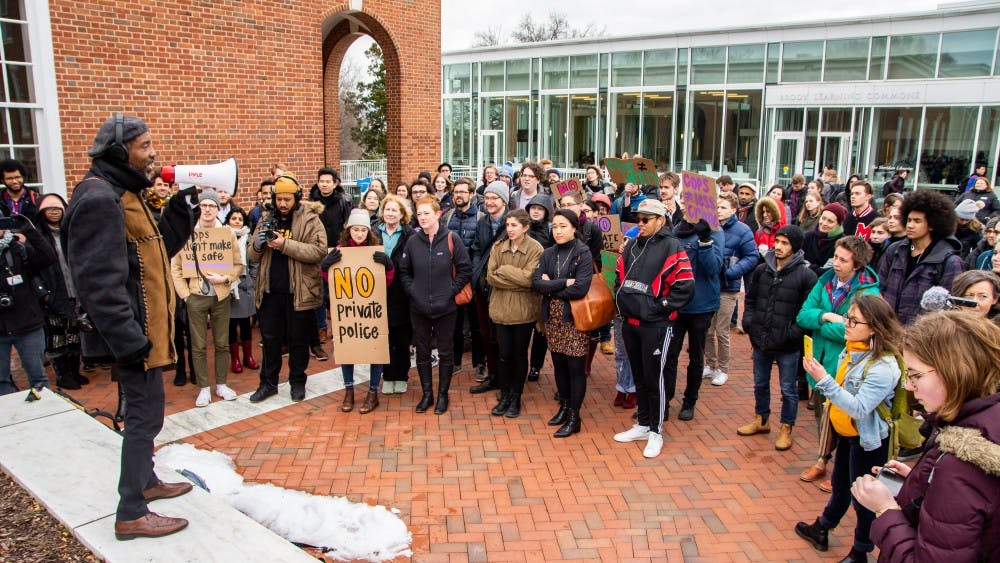“If this stuff gets separated from the police bill when it goes to the committee that wouldn’t be a bad thing,” Cleary said. “This is like putting lollipops in with the medicine.”
Students Against Private Police (SAPP) held a rally on Brody terrace in response to the bill on Wednesday, Feb. 13. SAPP reemphasized their opposition to a police force in a statement to The News-Letter.
“There is no bill which can address our concerns, because a private police force would A) inherently lack accountability, B) likely increase harm to marginalized communities, and C) lack residents’ and students’ support,” the statement read.
Lester Spence, an associate professor of Political Science, spoke at the rally. He criticized the University for seeking to increase policing in the city, adding that many of the hospitals and universities in Baltimore already have security forces in addition to the Baltimore Police Department.
“What we’re doing, not just nationally, but here in Baltimore, when we make the decision to say we want another police force, is we’re increasing the size of the police state as it currently exists in Baltimore,” Spence said at the rally.
Charles Village resident Nariman El Said said in an interview with The News-Letter that the purpose of the protest was to show Hopkins that the community is united in being opposed to the police force.
“[The University] can try to portray it as something that the community is for, but I think the numbers and the petitions amongst the student body and the community show otherwise,” she said.
An interim study which the University released in December stated that “while fewer supporters weighed in during public events, a significant number of individuals expressed support through one-on-one conversations and online.”
The Student Government Association released preliminary results of an omnibus referendum on Feb. 6. The referendum asked undergraduates the question whether they support the creation of a private police force, to which 74.76 percent responded “no.”
Indu Radhakrishnan stated that she doesn’t see a large body of support for the bill and that, in fact, many students seem to be opposed to it.
“Why are we trying to push forward something that is so deeply unpopular?” she said. “If we are the stakeholders here and we are the people that are being protected, we should have some sort of buy into this.”
Others are also hesitant to support a Hopkins police force. This includes Senator Mary Washington, who submitted an alternative bill to the Maryland General Assembly. Senate Bill (SB) 717 would still allow Hopkins to create its own police force, but it would also place restrictions on the powers of campus police officers depending on what properties they patrol.
There are similarities between Washington’s bill and the bill sponsored by Hayes that the University favors, Ridge said, including a recognition that fully sworn University police officers can make a meaningful contribution to public safety. She also wrote that the University recognizes Washington’s concerns about ensuring that a police force would be publicly accountable.
Ridge explained why the University supports Hayes’ bill, rather than the model of policing outlined in Washington’s bill.
“One of the options considered through the fall and described in the ‘Interim Report’ was Senator Washington’s suggestion to establish a dedicated unit of the Baltimore Police Department (BPD) designated specifically for universities in Baltimore, including Johns Hopkins,” Ridge wrote. “Unfortunately, the feedback for this idea was very negative, largely because of concerns about the other challenges the BPD is facing. Even with our help and resources, BPD simply does not have enough officers to provide such a unit and faces a number of other urgent priorities.”
In contrast with Washington and other’s concerns, community member Kevin Cleary believes that SB 793 has done a good job of addressing community concerns that came up during the public forums on policing hosted by the University. He stated that it is not truly a private police force because there are so many accountability provisions.
These provisions include the creation of a 15-person University Police Accountability Board, body-worn cameras and placing the force under the jurisdiction of the Civilian Review Board.
“Even though it’s a private force, the provisions of this bill make it an entity that’s under constant review by the public,” Cleary said. “There’s many ways this bill creates a strong public engagement with this private police force.”
However, Cleary also said that it is important for those who are skeptical of the police force to continue voicing their concerns.
“I’m hoping as we go forward that people who are mistrustful do pay attention, do come to the meetings, do continue to be constructive critiques of the process so that it can be stronger,” he said.
Claire Goudreau contributed reporting.
Correction: An earlier version of this article incorrectly referred to Nariman El Said as “he”, the article has since been corrected. The News-Letter regrets this error.





Please note All comments are eligible for publication in The News-Letter.